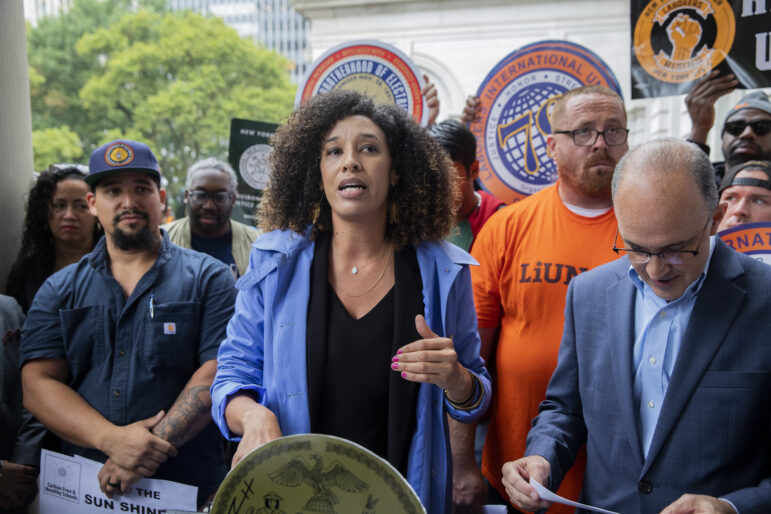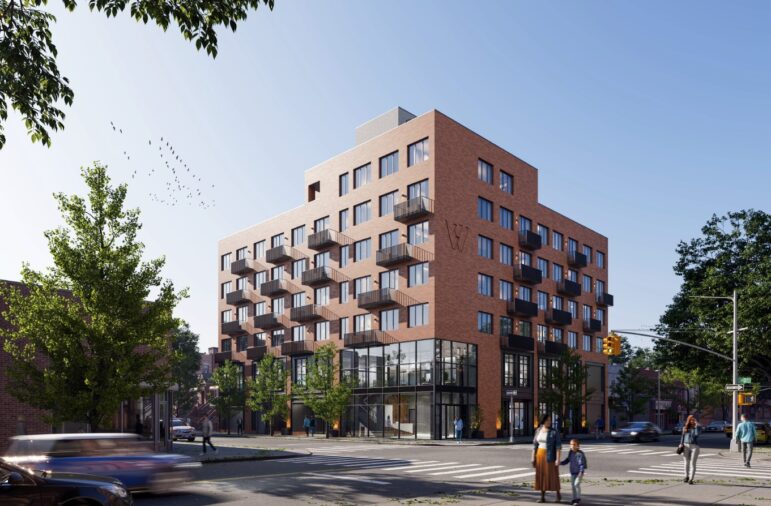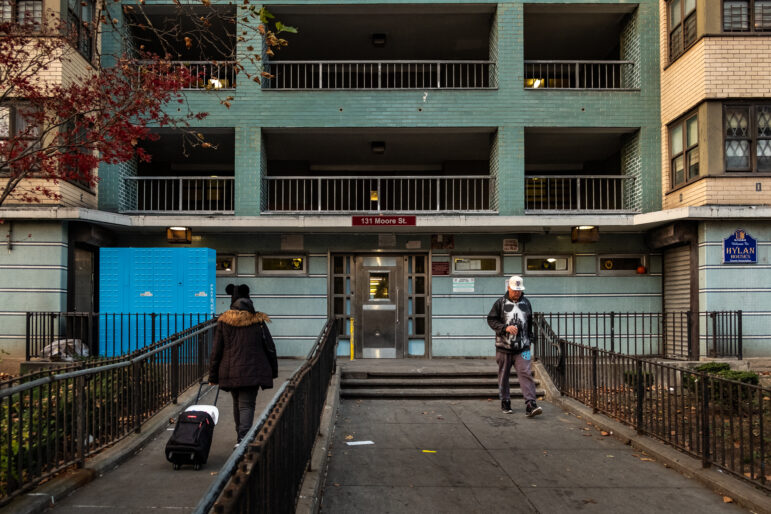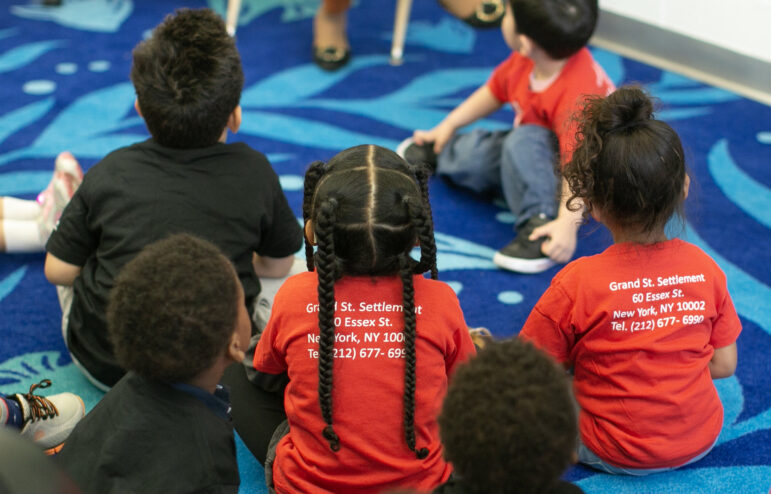The Department of Sanitation (DSNY) and NYPD, the two main enforcement agencies for street vending rules since 2023, have together issued 9,028 tickets to vendors so far this year. The uptick comes as voters last Tuesday approved Ballot Proposal 2, which expands Sanitation’s enforcement authority over vending.
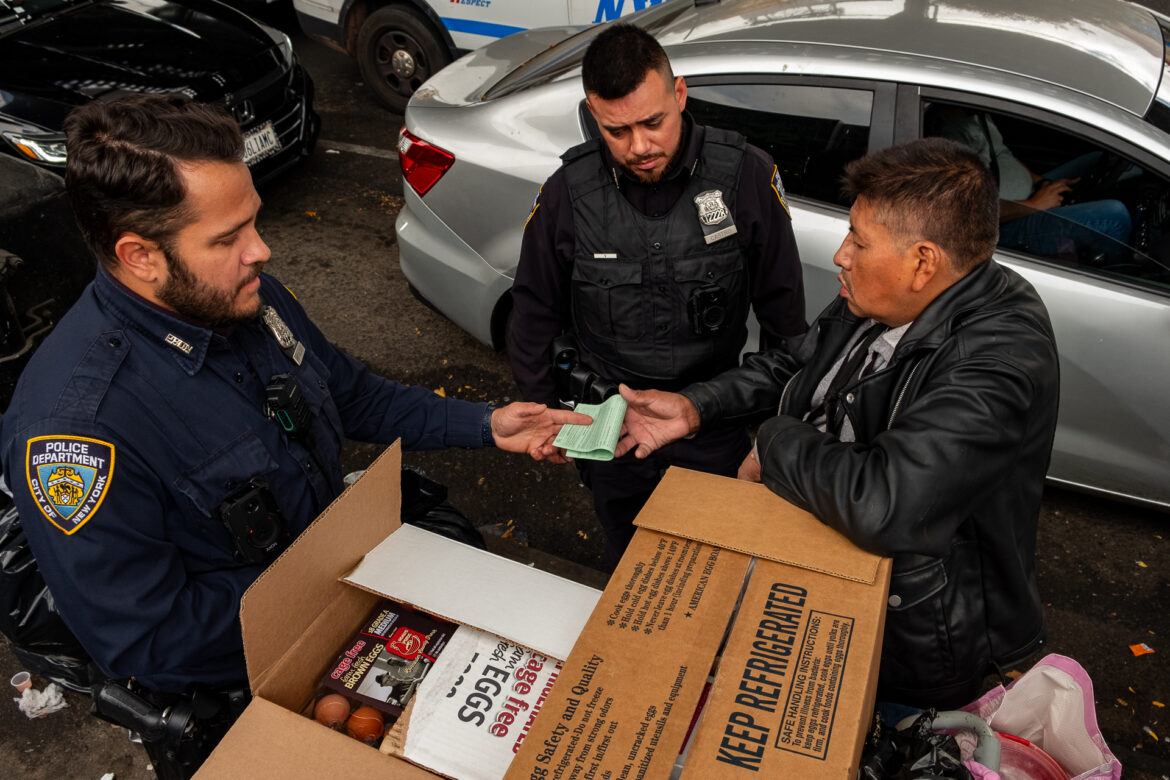
Adi Talwar
Police issuing a summons to a street vendor near the 7 train at Corona Plaza station in Queens on Oct. 29, 2024.Lea la versión en español aquí.
Editor’s note: After this story was published, New York voters approved ballot Proposal Number 2, with nearly 62 percent of ballots in favor of the measure, according to the city’s Board of Elections. This story has been updated to reflect that.
Under the stairs of the elevated subway platform of the 7 train, five street vendors, each with their own story of immigrating to New York, hawked their wares from hand trucks and pushcarts. The metallic screeching of the train dulled their voices each time it approached.
While peddling food, fruits, or vegetables, the vendors say they keep eyes and ears on passersby to quickly identify cops, and also share information in WhatsApp groups of any sightings. But sometimes, police can catch them off guard, unleashing a stampede of vendors running to avoid getting a ticket.
This is how Guillermo was caught on the afternoon of Oct. 29, while a City Limits reporter was talking to vendors across the street from Corona Plaza in Queens. Guillermo, who did not reveal his last name out of fear after interacting with the police, was unable to run because of a knee injury he suffered three months ago that permanently sidelined him from physical labor in the construction industry, where he used to work.
Since leaving the hospital and completing physiotherapy, he has been selling vegetables, fruits, and eggs on the street to support his two children, aged 9 and 7.
“Why aren’t they where the killers are?” Guillermo, 54, said in anger in Spanish, after receiving two tickets that day, including one for vending without a license—a common infraction in a city where the number of vendor licenses are limited. “They don’t want me to work! I’m not doing anything wrong, I just want to work.”
Since 2022, when Mayor Eric Adams and the NYPD launched a citywide initiative to tackle quality-of-life issues, the number of tickets given to street vendors has been increasing, as previous reporting by City Limits found.
This year so far, DSNY has doled out 3,281 tickets to vendors, as of October. Sanitation summonses alone represent more than double the 1,535 tickets the agency issued last year since April 2023, when the city made DSNY responsible for enforcement.
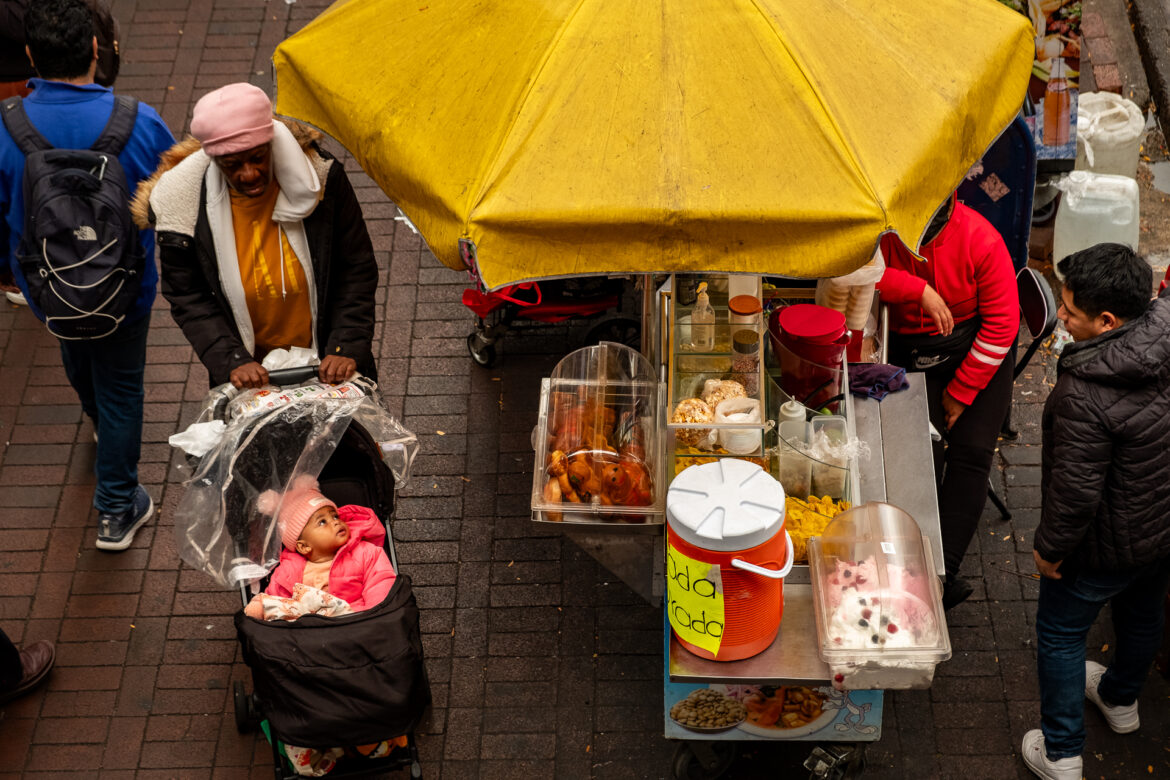
Adi Talwar
Street vendors near the 7 train Junction Blvd station in Queens on Oct. 29, 2024.At the same time, New Yorkers last Tuesday voted to approve ballot question No. 2, which expands the Department of Sanitation’s (DSNY) enforcement authority over vending.
Enforcement expansion
That afternoon, under the stairs of 7 train platform, Guillermo received two tickets: one for selling in front of the entrance to a shop, and one for not having a license. A woman who had stopped to buy eggs from him just as the police arrived later told a reporter that she had also received a ticket in Manhattan that same day, for selling packaged lunches to workers.
While Sanitation controls waste management on New York City streets and sidewalks, New Yorkers are currently voting yes or no to expanding its authority, one of several Charter amendment proposals that will appear on the back of the ballot during Tuesday’s election.
“The [city] Charter does not expressly grant DSNY concurrent enforcement authority over vending that occurs on City property other than its streets and sidewalks, such as in parks,” explains the Charter’s final report.
Approval of Ballot Proposal 2 is expected to change that. It will “expand and clarify the Department of Sanitation’s power to clean streets and other City property,” according to the measure.
Though it does not explicitly include language about Sanitation’s ability to ticket street vendors in parks, advocates fear that would be the practical effect, and comes at a time of increased enforcement against vendors, who’ve been subject to more tickets in recent years after a pandemic lull.
Carina Kaufman-Gutierrez, deputy director of the nonprofit Street Vendor Project, said that Proposition 2 intentionally included misleading language that hides the real impact. “We’ve seen time and again that these crackdowns on vendors are violent, unjust, and do nothing to solve the root issues of economic inequality in our city,” she said.
“There’s a lot of misinformation out there about street vendors, and New Yorkers deserve the truth about what’s really at stake for our city’s economy and vibrant food culture,“ she added.
The text of the proposal focuses on giving Sanitation the power to require the disposal of waste in containers, a proposal that Mayor Adams has pushed to end piles of garbage and combat his public enemy number one, rats.
There is no mention in the text of extending Sanitation’s enforcement powers over street vendors as an add-on. Currently, under city rules, other city agencies, such as the Department of Parks and Recreation and the NYPD, can also issue tickets to unauthorized vendors in parks. The Parks Department specifically addresses vending in and around parks, and the number of tickets issued by the agency has doubled since 2022.
So far this year, DSNY and NYPD, the two main enforcement agencies for street vending rules since 2023, have issued 9,028 tickets to vendors.
That includes 5,747 tickets from the NYPD alone during the first nine months of 2024, according to City Limits’ analysis of the police department's quarterly reports. That’s up from 1,812 tickets from police during the entire year of 2019, before the pandemic hit.
The Sanitation Department, which took over vendor enforcement duties from the Department of Consumer Affairs and Worker Protection in the spring of 2023, issued 3,281 of its own vending tickets so far this year.
“Our enforcement work is rooted in the belief that all New Yorkers, across every neighborhood, in every borough, deserve clean, safe sidewalks,” a Sanitation spokesperson said. “While we take a warnings-first approach—often posting dozens of warning signs throughout an area before taking any enforcement actions—we also engage in robust enforcement to protect cleanliness and quality of life.”
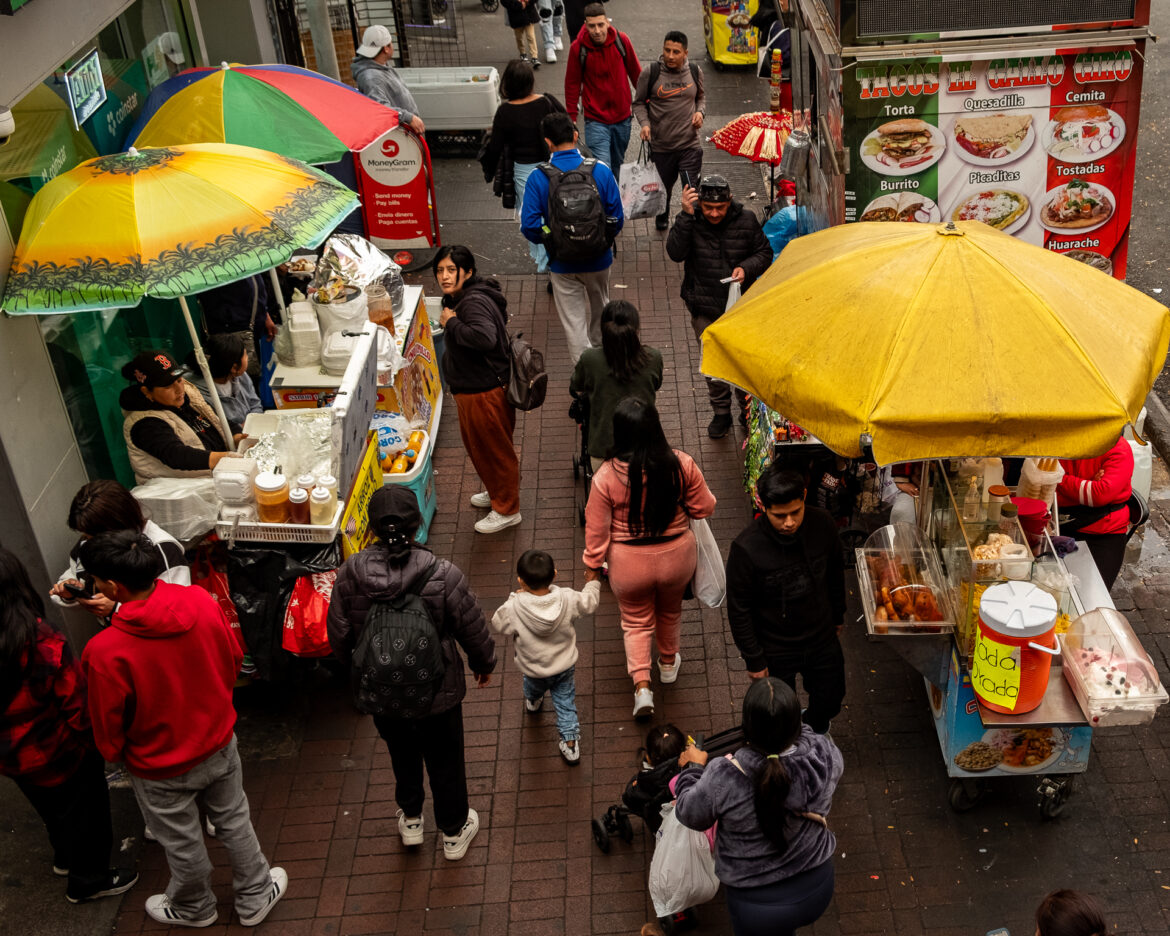
Adi Talwar
Street vending along Roosevelt Avenue in Queens, where the city has focused its quality of life enforcement in recent weeks.More enforcement with ‘Operation Restore Roosevelt’
In addition to more fines this year, in mid-October, Mayor Eric Adams launched Operation Restore Roosevelt, a 90-day, multi-agency effort focusing on sex work, retail theft, vendors, and "other quality-of-life concerns" along Roosevelt Avenue in the Elmhurst, North Corona, and Jackson Heights neighborhoods of Queens.
Launching the operation, the mayor recognized Roosevelt Avenue as one of the city's most diverse. “This road should be the pride of our city, but for too long it has been plagued by persistent public safety and quality-of-life issues. We won’t allow this to continue any longer,” he said.
“Addressing the issues on Roosevelt Avenue is a priority for the Queens District Attorney,” A spokesperson for the DA, Melinda Katz, said. This year, the office has processed 55 arrests on charges of operating and patronizing illegal brothels: 25 of those cases were documented to take place on or near Roosevelt Avenue, and the office has closed 13 locations used for illegal activity on or near the street, the spokesperson said.
The district attorney's office added that it has made 13 convictions of people managing houses of prostitution in the district, while 21 cases are currently pending: 12 felony promoting prostitution cases and nine sex trafficking indictments. Approximately 17 percent of such cases are connected to the neighborhoods in the “Restore Roosevelt” operation.
City Limits reached out to all the agencies involved in the operation, all of which referred questions to City Hall and NYPD, while just a few provided specific information about their roles and actions so far. A spokesperson said that the NYPD will provide results of the operation upon its completion.
The Department of Homeless Services (DHS) said it has been doing daily outreach across Roosevelt Avenue as part of the initiative, and between Oct. 15 and 23, connected three people experiencing unsheltered homelessness to shelter, a DHS spokesperson explained. Multiple other individuals believed to be experiencing homelessness declined services, the spokesperson added.
When asked about early results and the number of tickets issued to vendors in the immediate area, neither Sanitation nor the police provided specific information. But Kaufman-Gutierrez said that since the operation was launched, vendors are reporting daily sweeps from the police and/or Sanitation.
Carmen, a migrant who left the city's shelter system six months ago, was selling mangoes, strawberries, blueberries, and bananas near Guillermo when the police arrived last week, a City Limits reporter observed.
Carmen, who asked that her last name not be used for fear of immigration consequences, was selling along with her daughter, who had another market cart filled with fruit, and her granddaughter.
"This is how we earn our daily bread honestly," Carmen, 42, said in Spanish, detailing how she was able to save up to rent an apartment with the earnings.
Carmen and her family members, along with two other vendors with their hand trucks and push wagon carts, had already relocated that afternoon, running from another corner when they saw a policeman walking towards them.
The cat-and-mouse game is complicated: some police officers pass by vendors without talking to anyone; some just stop and wait; while others arrive, ask for licenses and permits, confiscate the vendors’ wares, and leave: all in a matter of 10 minutes, as it happened to Guillermo.
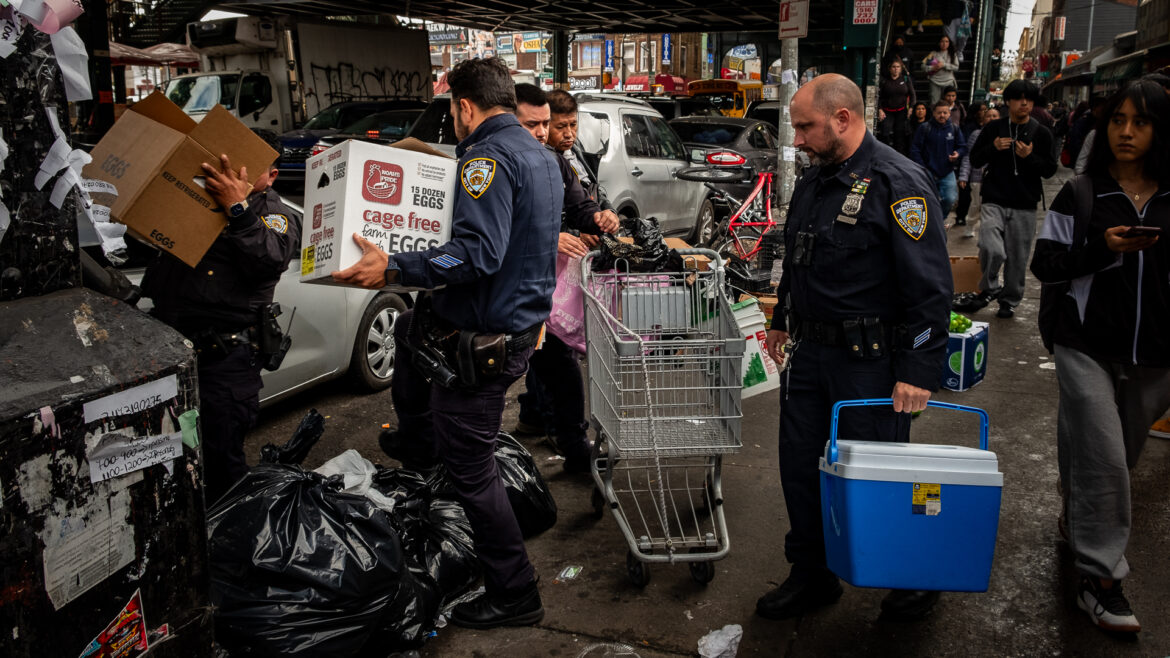
Adi Talwar
Police confiscating the property of a street vendor after issuing summons near the 103 St–Corona Plaza station in Queens on Oct. 29, 2024.The Parks Department, one of the agencies involved in the initiative, said that since the operation was launched they have doled out just two summonses for unlawful vending in the targeted areas. However, Queens Community Boards 3 and 4, which cover the north and south sides of the targeted area of Roosevelt Avenue, this year accounted for 15.5 percent of all Sanitation vending summonses.
Moreover, within the seven parks in these two community boards, the Parks Department issued 29 of the 83 total tickets issued in Queens between January and October, representing nearly 35 percent of all tickets issued in the borough.
Advocates such as Kaufman-Gutierrez emphasized the need for licensing reform for street vendors, noting that current enforcement efforts are largely focused on license violations under a system that doesn’t allow the vast majority of vendors to obtain a legal permit, due to a decades-old cap on the number of permits available.
“I don't have $5,000 to pay for a permit,” Guillermo said, referring to the only pay-for-play option left for many, which is to obtain a license on the black market. The day he was ticketed, officers confiscated his boxes of fruits and eggs.
“What am I going to do?” he said. “I don’t know. I don’t know.”
New laws for old problems
The City Council’s passage of Local Law 18 in 2021 aimed to both lift the cap on the number of available vending permits and undermine the underground market for selling them.
But so far, the city has only allowed a few hundred new vendors to sell legally since the law was passed, after an initial delay in the launch of the additional licenses, and a slow pace of approval for the 445 new permits (now called supervisory licenses) per year into the system.
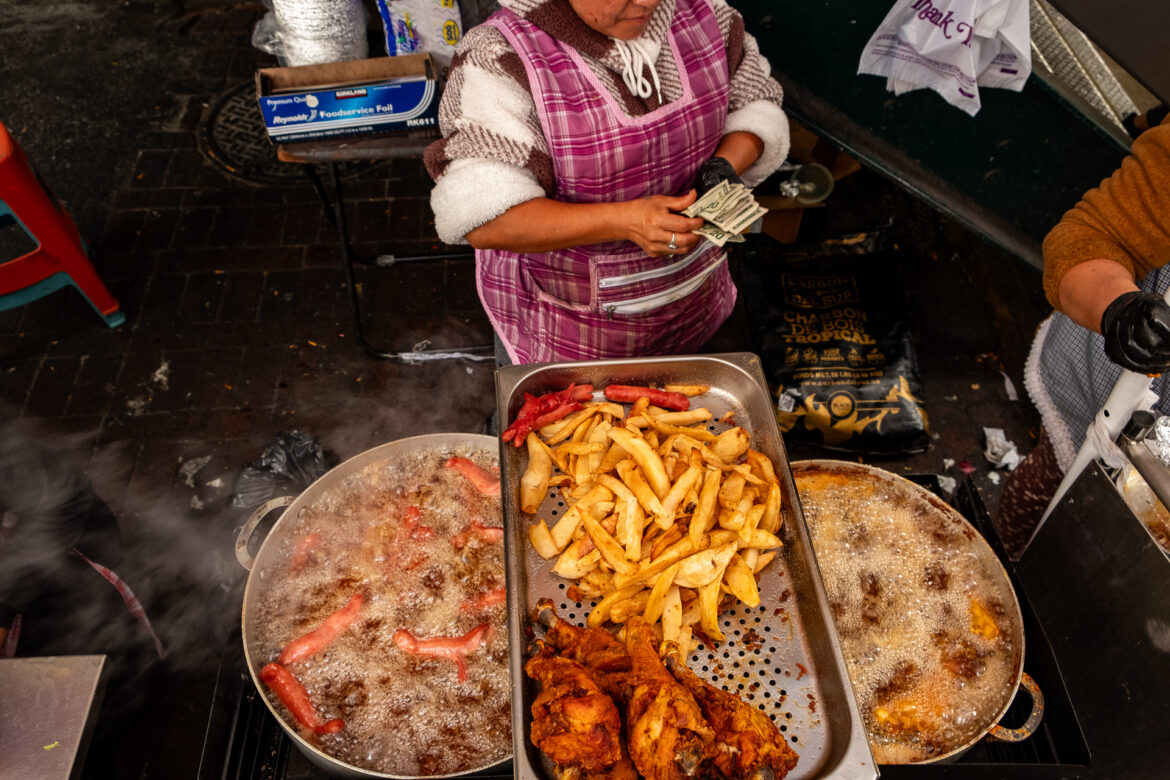
Adi Talwar
A vendor cooks and sells food near the 7 train Junction Blvd. station in Queens on Oct. 29, 2024.Questions from City Limits about how many vendors have been granted a supervisory license this year were not answered by the Department of Health and Mental Hygiene (DOHMH), which is responsible for issuing the new permits under local law. ABC reported that only 127 had been issued, as of May.
Last year, Councilwoman Pierina Sanchez introduced legislation to increase the number of both supervisory licenses and general vendor licenses available each year for five years in the city—to then lift the cap of both altogether. But for two years, the bill has stalled in the Council’s Consumer and Worker Protection Committee, chaired by Councilmember Julie Menin.
“I continue to work with all stakeholders as legislation within the Committee on Consumer and Worker Protection goes through the legislative process,” Menin said in a statement when asked about the status of Intro. 431, co-sponsored this year by Councilmember Amanda Farías.
Menin added that the committee passed three pieces of legislation this year that enacted recommendations from the city’s Street Vending Advisory Board’s 2022 report.
Sanchez said her bill currently has 20 sponsors, including the borough president and the public advocate, and her goal is to have a hearing on the legislation within the next year.
In the meantime, vendors along Roosevelt Avenue, like Guillermo, who has lived in the city for 26 years, ponder their future.
"Where am I going to get money if my kid needs medicine? Or if one needs school supplies?" wondered Guillermo minutes after the police confiscated his cart, cooler, and fruit boxes last week.
"I want them to have a good education so they can have important jobs, in offices, and not go through this,” he said. “But what do I tell them tonight if they need something?"
To reach the reporter behind this story, contact Daniel@citylimits.org. To reach the editor, contact Jeanmarie@citylimits.org
Want to republish this story? Find City Limits’ reprint policy here.


